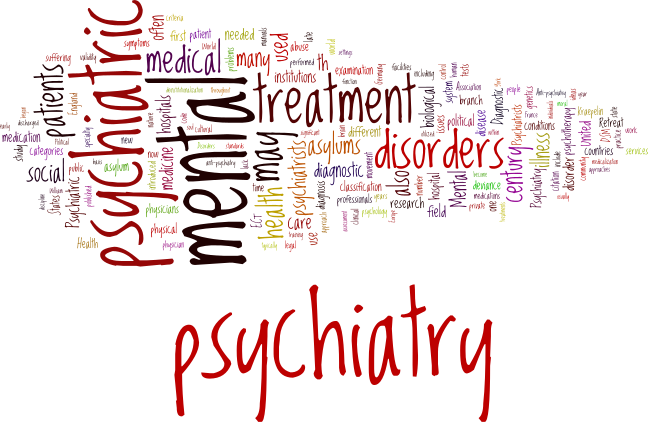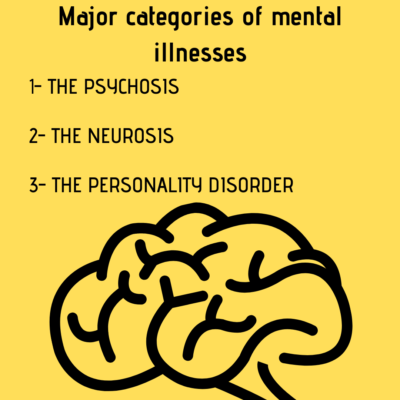
Psychiatry is a Greek word meaning ‘’ mind’’ and ‘’ medical treatment’’ is the branch of science devoted to the diagnosis, treatment, and prevention of mental ill-health. There is no clear dividing line between physical medicine and psychiatry.
-

The Realm of Psychiatry or Mental Disorders.
Psychiatry, alone cannot safely ignore the relationship between the bodily condition and mental state, and medicine is becoming increasingly attentive to the manner in which a person’s emotional state can precipitate and aggravate physical ill-health.
The Many Causes of Mental Illness
There is never a single or simple cause for mental illness. In practice, a distinction is drawn between predominantly intrinsic or endogenous causes, such as inherited factors, and predominantly extrinsic or exogenous causes, such as physical injury or disease, and mental stress such as bereavement, unexpected financial reverses or the loss of a job.
-

Mental Illness / Disorders.
The interaction between a person’s basic personality and any physical or emotional stress affects the extent of any subsequent mental reaction. One man or woman may be able to cope with massive stress quite adequately, whereas other individuals may be overwhelmed by what seems a minor setback.
Disorders of the Mind
The symptoms and signs of mental illness can be grouped differently under various sections such as – disorders of perception: of thought and speech: of memory: of emotion: of the experience of the self: of consciousness; and motor disorders.
The Perception of Hallucination
Hallucination is a sensory perception without any external, objective stimulus and is a common perceptual disturbance in psychotic illnesses and brain disorders. Symptoms of thought psychiatric disorders include a flight of ideas, in which the thought processes are speeded up, perseveration, whereby the patient, ‘’perseveres’’ with a particular response long after a change in his immediate environment has demanded a different response. Also, thought to block in which there is a sudden arrest of the train of thought and the start of an entirely new one.
-

Hallucination.
In certain psychiatric disorders [obsessional states for example], the patient recognizes that he is compelled to think about certain things, despite his every effort to rid his mind of them. Such compulsion is understood by the patient to originate within him and not as a consequence of some alien activity.
In thought alienation, however, the patient experiences his thoughts as being under the control of some external agency. He may believe that others are participating in his thinking or that thoughts are being inserted into or extracted from his head, or that others think his thoughts in unison with him, and are aware of his most intimate contemplations.
The Theory of Delusion
A delusion is defined as a false belief of morbid origins, and which is an absolute conviction unamenable to reasons or contradictions, although, usually absurd or even impossible.
-

Thought Disorder.
Disorders in the form of thinking are characterized by a fragmentation of the links connecting successive thoughts, and the phenomenon of over-inclusiveness, in which the patient is unable to maintain the boundaries of a concept.
Memory disorders
Disorders of the memory include disturbances in the registration of information, [such as by lack of concentration], and in the retention and recall of materials. Where there is a pathological memory loss, the gap may be filled with elaborate fabrications, as in alcoholic psychosis.
Emotional disorders
Disorders of the emotional kind consist of variations in the intensity or duration of the emotional response, which may also be inappropriate to the particular situation. In this, there is one class of psychiatric disorder called the ‘’affective disorder’’ which refers to a sustained psychiatric disorder of mood, in which there are sudden mood swings as well as ‘’ depression’’ and ‘’ mania’’, rather than to a transient emotional reaction.
The Disorder of Depersonalization
In this mental disorder, a disturbance in the experience of the self occurs when the individual feels changed in comparison with his former state. He starts feeling like automation and watches his own actions ‘’ from outside’’.
Mental Derealization Disorder
Whereas in mental derealization, the individual perceives the outer world as strange and altered in some significant way. Both these disturbances of depersonalization and derealization are experienced on occasions by perfectly healthy people.
The Mental Disorder of Consciousness
Disorder of consciousness is mainly due to physical causes and include alterations in attention and concentration, a slow down in the thinking patterns, and a lack of direction in the thoughts and actions of the individual. The patient may be disoriented, may manifest disconnection and incomprehensible behaviour or may become delirious.
Motor disorders
In this type of mental illness, the patient shows symptoms of lack of initiative, mental retardation in speech and action and stupor. Some of the major types of motor disorders seen in mental illness are psychomotor activity, seen often in manic states; catatonic excitement, mainly characterized by stereotypy [such as monotonous repetition in speech, mannerisms, and movements]; and passivity feelings [whereby the patients believe in their impulses or feelings and are controlled by some outside agency].
Major categories of mental illnesses
There are three major criterions of mental illness:

1 The Psychosis – This consists of schizophrenia, manic depression, paranoid illnesses, the organic psychoses and psychoses associated with physical disorders;
2 The Neuroses – This consists of anxiety and phobic states, obsessive-compulsive disorders, hysterical and depressive neuroses.
3 The Personality Disorders – This includes alcoholism and drug dependence, the behavioural disorders of childhood, and a group of anomalies or deviations of personality that are not the result of psychosis or any other illness.
So, we see there are numerous types of mental disorders prevailing among mankind today, of which a layman is not even aware of. A person may seem perfectly fine, but he may be suffering from one of the other mental illnesses like depression, split personality, bipolar, etc. But most of the mental disorders have been identified by biologists and analysts, and proper treatments are available, though it may be time taking and persistent.
Also, these illnesses have a tendency to reoccur at the slightest disturbance. So, to tackle these abnormalities, patience, dedication and will power is very important together with appropriate medication and counselling.